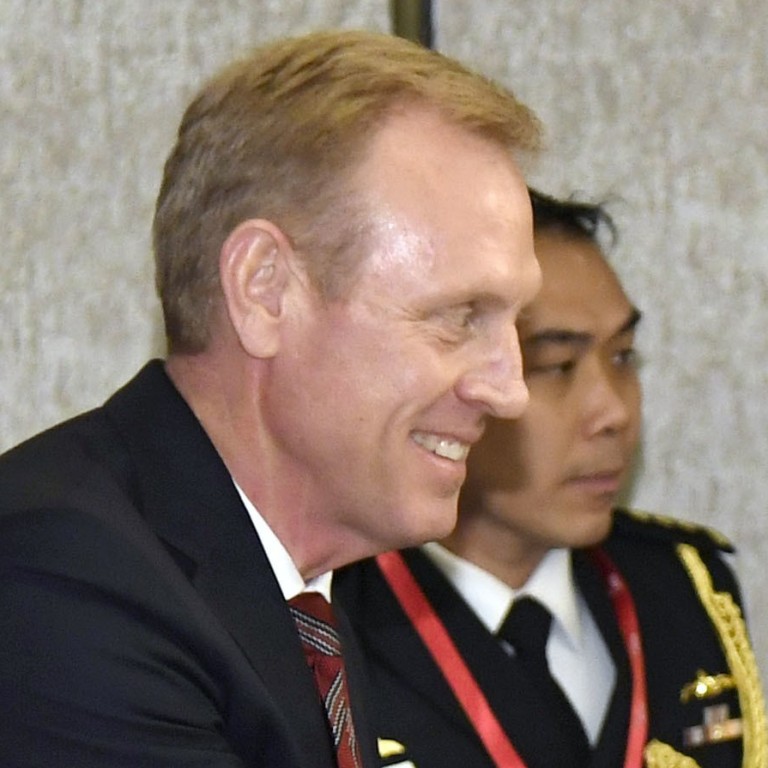
US-China rivalry will continue to roil Asia – even as Beijing and Washington avoid military clash
- Defence chiefs Patrick Shanahan and Wei Fenghe showed they were open to cooperation and hinted at a level of mutual understanding on security issues at the recent Shangri-La Dialogue
- But neither side will cede ground on security priorities so the Sino-US strategic stalemate will continue to shape regional diplomacy
Another year, another Shangri-La Dialogue. Discussions at the premier international security forum in Asia covered a range of issues: climate change, cybersecurity and the South Pacific island states’ security.
However, long-standing security challenges continued to dominate, particularly those involving great power rivalries. The stand-off between China and the US on various issues has played out publicly in recent months, but the summit in Singapore once again demonstrated the benefits of quiet, behind-the-scenes diplomacy.
Three key takeaways reflect the focus of this year’s summit as well as the ongoing challenges likely to define regional diplomacy in the short term.
Tamping down rhetoric
The first and fourth plenary sessions featuring US Acting Secretary of Defence Patrick Shanahan and Chinese Minister of National Defence General Wei Fenghe respectively were perhaps the most anticipated.
Neither Shanahan nor Wei offered radically new strategic perspectives of the present and future international order. There was, however, a contrast in the tone underpinning their speeches.
Shanahan avoided explicitly mentioning China in his discussion of the US Indo-Pacific strategy, and the language was far more mild than in the recent Indo-Pacific Strategy Report published by the US Department of Defence.
Erosion of nations’ sovereignty must end, US defence chief
On the other hand, Wei’s speech was tough, although nuanced. He emphasised China’s hardline position on contentious issues that have shaped its relationship with the US: trade, Taiwan and the South China Sea. However, his speech also hinted at the possibility of cooperation.
He described Sino-US military relations as “generally stable” and stressed that confrontation between the two powers would not be “in the interest of China and the US, and the world at large”.
Clearly, despite bilateral ties becoming increasingly strained in recent times, neither country seeks direct confrontation. Instead, they recognise the potential for cooperation, perhaps even viewing it as an emerging necessity.
The benefits of backchannels
In public, both Washington and Beijing have presented their strategic narratives as acts of public diplomacy. For Beijing, though, the approach to the summit also took account of domestic political considerations.
This was the first time a Chinese defence minister attended and spoke at the Shangri-La Dialogue after an eight-year hiatus. Given the heightened interest at home in China, Wei could not be seen ceding ground on China’s core interests.
Behind the scenes, though, Shanahan and Wei met on the sidelines of the summit before their speeches, suggesting both defence chiefs may have reached a certain level of mutual understanding on contentious security issues.
The often overlooked benefits of an international security forum like the Shangri-La Dialogue include such opportunities for senior officials to iron out differences face to face and discuss military confidence-building mechanisms.
Shanahan also met with his Asean counterparts, likely taking note of their broader concerns regarding Sino-US relations, and their anxieties about being forced to pick sides or becoming collateral damage in the event of any military escalation.
Strategic stalemate
China and the US will continue on divergent paths over key strategic security issues, such as Taiwan. But some form of accommodation might be reached in the foreseeable future on trade issues.
Neither side is likely to budge on key strategic security priorities. However, Beijing and Washington will likely avoid military confrontation given their economic interdependence, while chipping away at each other’s interests and influence through other means.
The Sino-US rivalry is unlikely to subside, leaving many other countries in the region in an awkward position, attempting a delicate balancing act in pursuit of peace and stability.
Singapore prime minister urges China and US not to pressure small nations
A number of Asean ministers, including Singapore’s Prime Minister Lee Hsien Loong in his keynote address last Friday, highlighted their concerns about the impact on smaller countries.
Nobody wishes to choose sides in the Sino-US stand-off. The Shangri-La Dialogue therefore offers a vital platform for China and the US – and other countries within the region – to promote cooperation and address common security challenges.
Nonetheless, the strategic stalemate between Washington and Beijing appears certain to shape regional diplomacy over the next 12 months before the summit convenes once again in Singapore.
Collin Koh is research fellow at the S. Rajaratnam School of International Studies, Nanyang Technological University, Singapore

